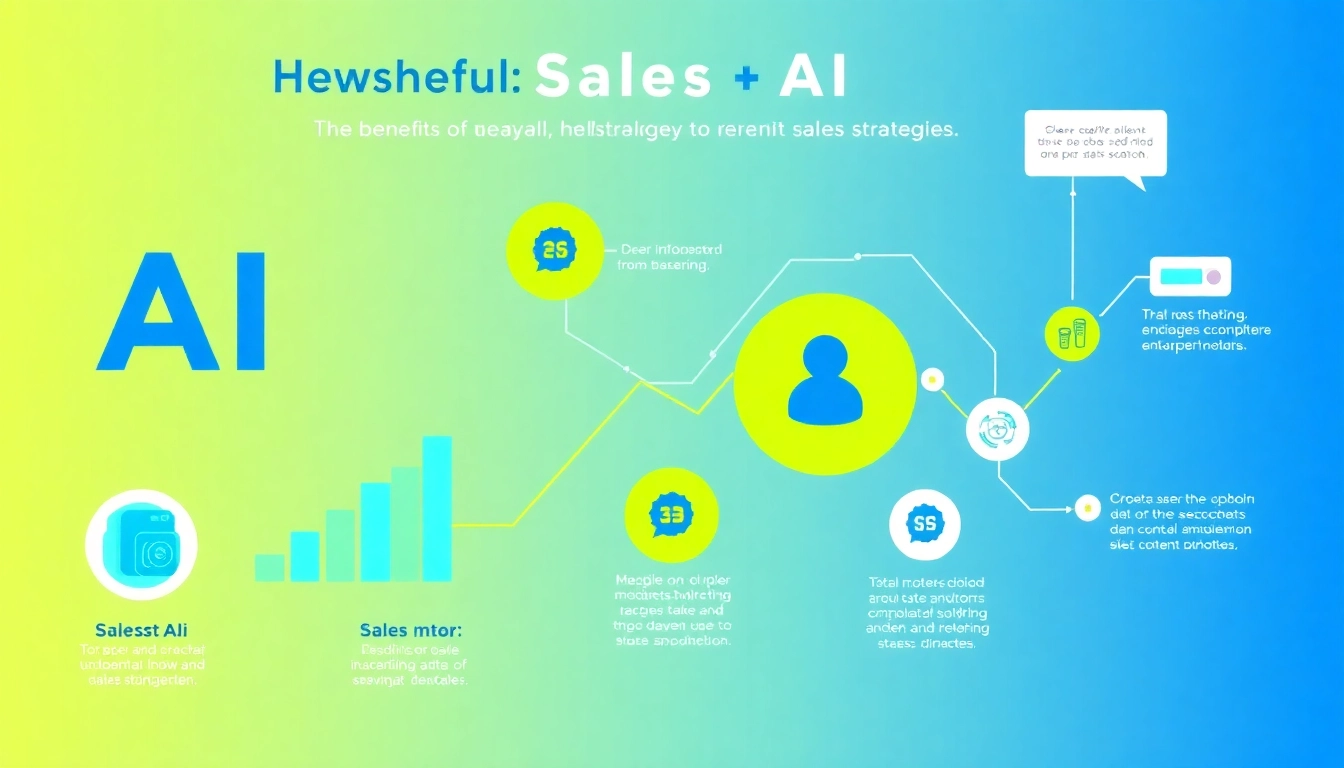Introduction to Sales AI
In today’s rapidly evolving business landscape, Sales AI has emerged as a transformative force that is reshaping the way organizations approach their sales processes. As sales teams face increasing pressures to generate leads, close deals, and cultivate customer relationships, leveraging artificial intelligence (AI) has become essential. With the capability to analyze vast data sets, automate repetitive tasks, and provide actionable insights, Sales AI is not just a trend but a vital component for success in the modern sales environment.
Understanding Sales AI and Its Importance
Sales AI refers to the integration of artificial intelligence technologies into sales processes, enhancing efficiency and effectiveness. It employs algorithms and machine learning techniques to analyze patterns in customer behavior, predict outcomes, and assist sales professionals in making data-driven decisions. The importance of Sales AI lies in its ability to streamline efforts, reduce manual workloads, and enhance overall sales performance.
Key Components of Sales AI Technology
Several key components make up Sales AI technology. These include:
- Machine Learning: Allows systems to learn from historical data and improve their performance over time without explicit programming.
- Natural Language Processing (NLP): Enables machines to understand and interpret human languages, facilitating better communication with customers.
- Predictive Analytics: Uses historical data to forecast potential sales outcomes, helping teams plan their strategies accordingly.
- Chatbots and Virtual Assistants: Automate customer interactions, providing instant responses and assistance while freeing up human resources for more complex tasks.
Current Trends in Sales AI Implementation
The implementation of Sales AI is witnessing several significant trends, including:
- Personalization: AI enables businesses to create tailored experiences for customers based on their preferences and behaviors.
- Integration with CRM Systems: More companies are integrating AI tools with their existing Customer Relationship Management (CRM) systems to enhance data utilization.
- Real-time Analytics: Sales AI tools are providing real-time data that empower sales teams to make quick decisions.
Benefits of Using Sales AI
Increased Efficiency in Sales Processes
One of the most significant advantages of Sales AI is the increased efficiency it brings to sales processes. By automating repetitive tasks such as data entry, follow-up emails, and scheduling, Sales AI enables sales representatives to focus on what they do best – closing deals and building relationships. Moreover, AI tools can process and analyze customer interactions much faster than humans, leading to quicker decision-making.
Enhanced Customer Insights and Personalization
Sales AI provides enhanced customer insights by analyzing data from various sources, including social media, past interactions, and purchase history. This allows sales teams to understand customer needs better and tailor their approaches accordingly. With AI-driven personalization, businesses can deliver unique experiences to customers, which significantly improves customer engagement and satisfaction.
Real-time Data Analysis for Forecasting
Real-time data analysis is another critical benefit of Sales AI. AI tools can continuously monitor market trends, customer behaviors, and sales performance, providing teams with up-to-date insights that inform their strategies. This capability not only aids in accurate forecasting but also helps in adjusting tactics on the fly, ensuring that sales efforts align with current market conditions.
Challenges in Adopting Sales AI
Common Barriers to Implementation
Despite its advantages, adopting Sales AI comes with challenges. Common barriers include a lack of technical expertise, resistance to change from sales teams, and inadequate data quality. Organizations must address these barriers by investing in training and creating a culture that embraces technological change.
Integrating Sales AI with Existing Systems
Integrating Sales AI into existing systems can be complex, especially if legacy systems are in use. Businesses need to ensure that their AI tools can seamlessly communicate with current software, which often requires additional customization and support. Establishing a clear integration strategy and involving IT teams early in the process can mitigate these challenges.
Addressing Data Privacy Concerns
With the increasing reliance on data, privacy concerns have become paramount. Ensuring compliance with regulations such as GDPR and CCPA is essential when implementing Sales AI solutions. Companies must prioritize data security and establish clear policies around data usage to build trust with customers and comply with legal standards.
Top Sales AI Tools and Software
Comparative Analysis of Popular Sales AI Tools
A variety of Sales AI tools exist, each offering unique features. Popular tools include:
- Salesforce Einstein: Integrates AI capabilities directly into the Salesforce platform, providing predictive analytics and automation.
- HubSpot: Offers intelligent lead scoring and marketing automation features customized for sales teams.
- Clari: Focuses on forecasting and pipeline management with real-time analytics and insights.
- InsideSales.com: Uses AI to guide sales strategies by prioritizing leads and automating follow-ups.
Choosing the Right Sales AI Software for Your Team
Selecting the appropriate Sales AI software requires careful consideration of your team’s specific needs, existing tools, and budget. When evaluating options, organizations should consider:
- Scalability: Ensure that the software can grow with your business.
- User-Friendliness: The tool should be intuitive so that team members can adopt it without extensive training.
- Integration Capabilities: Review how well the software integrates with your current systems and other tools.
User Reviews and Recommendations
It’s beneficial to consult user reviews and testimonials when considering Sales AI tools. Platforms such as G2 Crowd, Capterra, and Trustpilot can provide valuable insights into user experiences, highlighting both advantages and potential drawbacks. Engaging in peer discussions and seeking recommendations can also guide you toward the best solutions tailored to your organization’s requirements.
Future of Sales AI
Emerging Technologies in Sales AI
The future of Sales AI is bright, with emerging technologies driving its evolution. Developments in generative AI, advanced analytics, and voice recognition are expected to enhance the capabilities of Sales AI tools further. For instance, generative AI can create personalized sales scripts and email templates, while advanced analytics will enable deeper insights into market behaviors.
The Role of Sales AI in Shaping Future Sales Strategies
Sales AI is poised to play a critical role in shaping future sales strategies. By providing data-driven insights and automating processes, it empowers sales teams to develop more effective strategies tailored to their target markets. Organizations that embrace these changes are likely to stay ahead of the curve, enjoying improved conversion rates and customer relationships.
Preparing for a Sales AI-driven Market
To thrive in a Sales AI-driven market, organizations must be proactive in their approach. This involves investing in AI technologies, fostering a culture of continuous learning, and ensuring that teams are equipped with the skills necessary to leverage these tools effectively. By adapting to the shifting landscape, businesses can not only survive but also excel in the competitive sales environment of the future.



